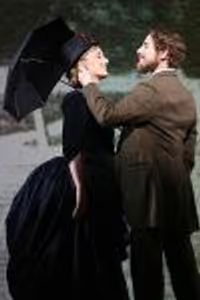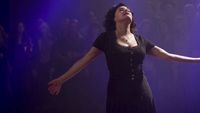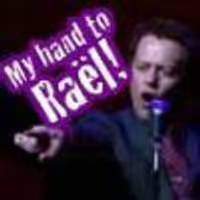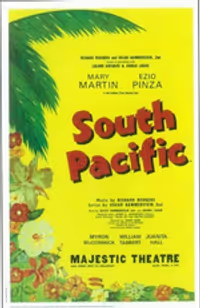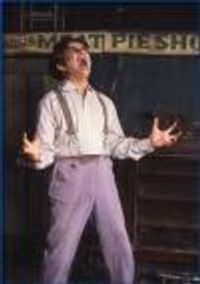Trigger Warnings Come to the Stage
#25Trigger Warnings Come to the Stage
Posted: 11/19/18 at 5:00pm
I have to say, I was very surprised to open this tread and find that almost every single comment here is in favor of content warnings. I'm completely with you, but the last few threads on this topic have been absolute sh*it-shows, full of whiny curmudgeons complaining about how sensitive people are these days. I'm genuinely surprised that none of them have chimed in on this thread yet.
#26Trigger Warnings Come to the Stage
Posted: 11/19/18 at 5:06pm
It's odd that people offended by trigger warnings complain about OTHER people being too sensitive.
#27Trigger Warnings Come to the Stage
Posted: 11/19/18 at 5:11pm
JBroadway, I felt the same way!
Also, this is a good thread:
https://twitter.com/halvorsen/status/1064377907840237568
#28Trigger Warnings Come to the Stage
Posted: 11/19/18 at 5:24pm
JBroadway said: "I have to say, I was very surprised to open this tread and find that almost every single comment here is in favor of content warnings. I'm completely with you, but the last few threads on this topichave been absolute sh*it-shows, full of whiny curmudgeons complaining about how sensitive people are these days. I'm genuinely surprised that none of them have chimed in on this thread yet."
Well, they are too sensitive but as discussed trigger warnings are nothing new in theatre and I can see the value for certain people. I mean certain productions could trigger epilepsy. For health and safety reasons people should be warned. I think we should revisit this thread if we ever get to a situation where the trigger warnings say ridiculous **** such as the Book of Mormon having to say “this show may offend believers” or an old show having to apologise for the way it might portray an outdated value that is ‘trigging’ But right now trigger warnings are typically used in an appropriate and thoughtful way in theatre. Not like the rooms that are set up to comfort those on college campuses who might hear an opposing viewpoint on a political issue.
#29Trigger Warnings Come to the Stage
Posted: 11/19/18 at 6:26pm
Well, I've been a theater-goer since before trigger warnings and, believe me, I've been traumatized:
I saw 'Gypsy' and immediately forced my younger brother to take tap lessons.
I saw 'Fiddler On the Roof' and then got arrested for playing my tuba on top of our garage at 4AM.
I saw 'Sweeney Todd' and enrolled in barber school until they expelled me after all my instructors mysteriously disappeared.
I saw 'Barnum' and my mother couldn't get me down from the clothesline for a solid week.
I sought treatment for my troubles but all therapy did was make me a chain-smoker who believes in reincarnation.
Oh, how I've suffered.
#30Trigger Warnings Come to the Stage
Posted: 11/19/18 at 6:30pm^I don't think you understand what triggers are.
#31Trigger Warnings Come to the Stage
Posted: 11/19/18 at 9:24pm
qolbinau said: "But right now trigger warnings are typically used in an appropriate and thoughtful way in theatre. Not like the rooms that are set up to comfort those on college campuses who might hear an opposing viewpoint on a political issue."
Not that I actually think I'll change anyone's mind who thinks that "safe spaces" and trigger warnings are for fainthearted PC Gen-Z'ers, but I work with college students and I have seen this kind of comment one too many time. Try working with college arts students sometime. In the several years I have been around them, not once has any of them needed a "safe space" because someone disagrees with them politically. The only people I've ever seen being flippant about triggers have been ones mocking the concept or people who need them. No one mocks me for appreciating warnings about strobe lights because of my photosensitive migraines; I don't mock others for appreciating warnings about violence and trauma because of their own sensitivities and traumas. College students (and especially college arts students), in my opinion, are sometimes a little too enthusiastic but also some of the most genuine people you will ever meet, who truly want to make great art but don't believe you need to "shock" people to reach that effect and believe that compassion and great art can co-exist.
#32Trigger Warnings Come to the Stage
Posted: 11/19/18 at 10:33pm
They have these warnings before news clips. Warnings of disturbing content, etc. Last year I remember there wss video footage of a boy being hacked to death with machetes in a bodega in which they had the warning. Don;t see why theaters shouldn't follow suit.
That being said the weirdest "trigger" I ever experienced was two women next to me kept insisting that Donna Murphy reminded them too much of Hillary Clinton for them to continue watching her. They left at intermission in Hello Dolly! i can't for the life of me see the similarity but ...
#33Trigger Warnings Come to the Stage
Posted: 11/19/18 at 11:25pm
Whenever I see a parent shielding their children from curses, I laugh. I'm a freshman in college, so I grew up with the protected children. We just get raunchier and raunchier. Covering your childs ears won't help (especially in NYC) since they already hear the radio on the bus (usually Nicki Minaj, XTent or Cardi B), and have friends at school cursing around them (This started in grade 4-5 for me, and in grade 6 it was normal and grade 9 kids started using the N word or calling things gay).
You can't protect your kid, sorry parents if you want a utopia where you can censor stuff from your "UwU precious son" but you can't. Language warnings other than for slurs against minorities aren't necessary.
I do think other warnings are valid and necessary though. For instance, graphic nudity at Angels in America would have been good to know or shows with hangings for suicide to have warnings for that. But warnings for suburban soccer moms to protect their children with? I just can't take those seriously.
#34Trigger Warnings Come to the Stage
Posted: 11/20/18 at 2:42am
bwayrose7 said: "qolbinau said: "But right now trigger warnings are typically used in an appropriate and thoughtful way in theatre. Not like the rooms that are set up to comfort those on college campuses who might hear an opposing viewpoint on a political issue."
Not that I actually think I'll change anyone's mind who thinks that "safe spaces" and trigger warnings are for fainthearted PC Gen-Z'ers, but I work with college students and I have seen this kind of comment one too many time. Try working with college arts students sometime. In the several years I have been around them, notoncehas any of them needed a "safe space" because someone disagrees with them politically. The only people I've ever seen being flippant about triggers have been ones mocking the concept or people who need them. No one mocks me for appreciating warnings about strobe lights because of my photosensitive migraines; I don't mock others for appreciating warnings about violence and trauma because of their own sensitivities and traumas. College students (and especially college arts students), in my opinion, are sometimes a little too enthusiastic but also some of the most genuine people you will ever meet, who truly want to make great art but don't believe you need to "shock" people to reach that effect and believe that compassion and great art can co-exist."
I appreciate they might be the hysterical minority but there are probably dozens and dozens of examples on YouTube where you can watch college students respond in an overly emotional manner that is probably disproportionate to the thread/stimulus that they are being exposed to (i.e., it helps raise the fundamental question: when does someone need to take the responsibility to work on themselves?). But this is a completely different situation than what is happening around decision making RE: Trigger Warnings in this thread, which is why I personally think the discussion has generally been compliant and civil.
Brian07663NJ
Broadway Legend Joined: 6/21/06
#35Trigger Warnings Come to the Stage
Posted: 11/20/18 at 8:55am
My personal trigger warning is that sign in the lobby of the theater that says “NO food inside the theater.” In fact, just last weekend I didn’t realize that I had a speaking role in the show that I was attending. After 5 full minutes, an entire scene, the woman behind me was unsuccessful in gaining entry to her candy bar. She was determined to get into it! That’s when I had enough. Making full eye contact with her I said out loud, so that everyone in the vicinity could hear me, “I am going to shove that candy bar UP you’re A$$ if you don’t stop!” Not a single person in the area even “ssshhh-ed” me. I don’t know what was wider…her eyes or mouth…she was that mortified.
#36Trigger Warnings Come to the Stage
Posted: 11/20/18 at 11:52am
qolbinau said: "bwayrose7 said: "qolbinau said: "But right now trigger warnings are typically used in an appropriate and thoughtful way in theatre. Not like the rooms that are set up to comfort those on college campuses who might hear an opposing viewpoint on a political issue."
Not that I actually think I'll change anyone's mind who thinks that "safe spaces" and trigger warnings are for fainthearted PC Gen-Z'ers, but I work with college students and I have seen this kind of comment one too many time. Try working with college arts students sometime. In the several years I have been around them, notoncehas any of them needed a "safe space" because someone disagrees with them politically. The only people I've ever seen being flippant about triggers have been ones mocking the concept or people who need them. No one mocks me for appreciating warnings about strobe lights because of my photosensitive migraines; I don't mock others for appreciating warnings about violence and trauma because of their own sensitivities and traumas. College students (and especially college arts students), in my opinion, are sometimes a little too enthusiastic but also some of the most genuine people you will ever meet, who truly want to make great art but don't believe you need to "shock" people to reach that effect and believe that compassion and great art can co-exist."
I appreciate they might be the hysterical minority but there are probably dozens and dozens of examples on YouTube where you can watch college students respond in an overly emotional manner that is probably disproportionate to the thread/stimulus that they are being exposed to (i.e., it helps raise the fundamental question: when does someone need to take the responsibility to work on themselves?). But this isa completely different situation than what is happening around decision making RE: Trigger Warnings in this thread, which is why I personally think the discussion has generally been compliant and civil."
LOL
So you think you know more about American college students than than someone who has been working with them directly for the past several years? That's so very you!
Care to provide a link to those dozens and dozens, of youtube videos? My guess is you can't. And if if they do exist with about 20 MILLION college students enrolled in the United States they would prove? Nothing.
#37Trigger Warnings Come to the Stage
Posted: 11/20/18 at 12:03pm
ErikJ972 said: "qolbinau said: "bwayrose7 said: "qolbinau said: "But right now trigger warnings are typically used in an appropriate and thoughtful way in theatre. Not like the rooms that are set up to comfort those on college campuses who might hear an opposing viewpoint on a political issue."
Not that I actually think I'll change anyone's mind who thinks that "safe spaces" and trigger warnings are for fainthearted PC Gen-Z'ers, but I work with college students and I have seen this kind of comment one too many time. Try working with college arts students sometime. In the several years I have been around them, notoncehas any of them needed a "safe space" because someone disagrees with them politically. The only people I've ever seen being flippant about triggers have been ones mocking the concept or people who need them. No one mocks me for appreciating warnings about strobe lights because of my photosensitive migraines; I don't mock others for appreciating warnings about violence and trauma because of their own sensitivities and traumas. College students (and especially college arts students), in my opinion, are sometimes a little too enthusiastic but also some of the most genuine people you will ever meet, who truly want to make great art but don't believe you need to "shock" people to reach that effect and believe that compassion and great art can co-exist."
I appreciate they might be the hysterical minority but there are probably dozens and dozens of examples on YouTube where you can watch college students respond in an overly emotional manner that is probably disproportionate to the thread/stimulus that they are being exposed to (i.e., it helps raise the fundamental question: when does someone need to take the responsibility to work on themselves?). But this isa completely different situation than what is happening around decision making RE: Trigger Warnings in this thread, which is why I personally think the discussion has generally been compliant and civil."
LOL
So you think you know more about American college students than than someone who has been working with them directly for the past several years?That's so very you!
Care to provide a link to those dozens and dozens, of youtube videos? My guess is you can't. And if if they do existwith about 20 MILLION college students enrolled in the United States they would prove? Nothing."
In fairness to qolbinau, I would say there are two separate issues here: college students overreacting (I hate the term "hysterical" for a lot of reasons), and trigger warnings. College students do overreact sometimes in a disproportionate way - but it's not because they're hypersensitive, it's because their brains are still developing and because they're experiencing a set of stressors that they never have before. I had a student break down in tears because she thought she bombed a big class presentation (she didn't, but she felt like she did) and was terrified it would tank her grade.
And in any case, trigger warnings are not the exclusive purview of college students. Many adults appreciate them too; they simply may not have been in an environment before where it was even an option to be pre-warned. I think it's a good thing, in general, that we're starting to accept that people have differing experiences and needs and try to be compassionate where we can. Again, I compare it to strobe lights: I, like many, appreciate the warnings so I don't feel sick during the show; a similar warning may help someone with PTSD or past trauma enjoy a show without feeling sick as well.
#38Trigger Warnings Come to the Stage
Posted: 11/20/18 at 12:11pmI feel like I have seen this at most regional theaters already, especially those with older patrons. Also I remember seeing this for the 1st National Tour of Spring Awakening back in 2008 (ie Sexual content, abuse, and a few others maybe?)
Paterson
Stand-by Joined: 10/4/08
#39Trigger Warnings Come to the Stage
Posted: 11/20/18 at 12:27pm
Sensible trigger warnings are definitely a good thing, but of course they need to be pitched at the right level, so they don't turn into the terms and conditions of an online contract that no-one bothers to read.
From a personal point of view, I'm happy to see just about anything, so long as it's in an appropriate context, and I believe it's important to expose children and teens to challenging material, but that doesn't mean I don't appreciate a bit of a heads-up. There are some plays where it is fine for parents to take their kids to, because they know their children have a basic understanding of the subject and will be ready to discuss the issues on the way home and over the following days. A kindly family friend might not want that responsibility, so it's good that people have the choice.
My only concern is when trigger warning spill over into becoming spoilers. I've never had a problem with this at the theatre, and patrons are literally forced to stay and watch or create a scene, unless they happen to be at the end of a row. But I've been annoyed when a key plot point was given away ahead of reading a book, and would have liked it if I could have read more if desired. If I'm watching something on tv or reading a book, it's easy enough for me to take a break and make a cup of tea. I can half-watch the scary bits on tv, or skim read a section of a book, so it's less critical IMO.
I think having a two-level system might be best. The basics go with the tickets and on a sign on the way in, but theatre staff and the website has an expanded version available to those who want to know more and are prepared to risk spoilers.
#40Trigger Warnings Come to the Stage
Posted: 11/20/18 at 12:41pm
It's been interesting reading all of these responses. A couple additional thoughts:
Posting written trigger warnings while using the actual term "trigger warning" is probably not a good idea at this point (this includes news articles, etc.). The term got abused and overused so much that it provokes a giant eye roll from even the most progressive and compassionate people. The term "content warning" is much better, as it means the same damn thing and won't provoke as much of a negative response.
As many posters have pointed out, posted warnings in theater lobbies about strobe lights, gun shots, haze, etc. have been standard for decades. What we are starting to see now is things like "Onstage depiction of rape/suicide." That's new. Although part of me thinks it makes sense to include these things, another part of me is like, "Uh...spoiler alert?" It's a fine line. Also, unless it's a totally new work, there is this amazing thing called the internet that people with sensitivities (or parental concerns) can use before seeing a play to find out about it. I don't see content warnings posted in movie theaters.
#41Trigger Warnings Come to the Stage
Posted: 11/20/18 at 2:17pm
The Distinctive Baritone said: "I don't see content warnings posted in movie theaters."
MPAA ratings usually specify what kind of potentially objectionable content a movie could contain.
#42Trigger Warnings Come to the Stage
Posted: 11/20/18 at 2:18pm
"I don't see content warnings posted in movie theaters."
Because movies have ratings.
#43Trigger Warnings Come to the Stage
Posted: 11/20/18 at 2:41pm
Good point.
Many theaters do have content warnings on their websites, but perhaps it should be the norm to do this from now on for ALL theater productions - and do it on ads too. That way audience members are more likely to know what they are getting into BEFORE buying tickets and entering the theater.
#44Trigger Warnings Come to the Stage
Posted: 11/20/18 at 5:50pm
"I do think other warnings are valid and necessary though. For instance, graphic nudity at Angels in America would have been good to know"
Why? No one under the age of 14 was permitted inside the theater. Were you that triggered by the brief, non sexual nudity?
#45Trigger Warnings Come to the Stage
Posted: 11/20/18 at 6:20pm
Angels in America Trigger Warning:
Flacid penises, cursing, simulated sex between two people at opposite ends of the stage, onstage death, discussion of political issues that would really piss off your grandparents.
#46Trigger Warnings Come to the Stage
Posted: 11/20/18 at 6:37pm
Also........blood.
Did I trigger anyone????
#47Trigger Warnings Come to the Stage
Posted: 11/20/18 at 7:39pm
Kind of funny that the person who was throwing a hissy fit about people sending prayers to Ruthie Ann Miles is complaining that people get too offended these days
annang
Broadway Star Joined: 10/9/16
#48Trigger Warnings Come to the Stage
Posted: 11/20/18 at 11:33pm
The Distinctive Baritone said: "It's been interesting reading all of these responses. A couple additional thoughts:
Posting written trigger warnings while using the actual term "trigger warning" is probably not a good idea at this point (this includes news articles, etc.). The term got abused and overused so much that it provokes a giant eye roll from even the most progressive and compassionate people. The term "content warning" is much better, as it means the same damn thing and won't provoke as much of a negative response.
As many posters have pointed out, posted warnings in theater lobbies about strobe lights, gun shots, haze, etc. have been standard for decades. What we are starting to see now is things like "Onstage depiction of rape/suicide." That's new.Although part of me thinks it makes sense to include these things, another part of me is like, "Uh...spoiler alert?" It's a fine line. Also, unless it's a totally new work, there is this amazing thing called the internet that people with sensitivities (or parental concerns) can use before seeing a play to find out about it. I don't see content warnings posted in movie theaters.”
Why is a warning about rape a spoiler, but a warning about a gunshot isn’t? I think you’re making a judgment call about the weight we should give to different “sensitivities,” and I’m not really sure that’s for us to decide. Especially because, even in an often-performed work, directors make all kinds of changes about how certain moments are portrayed, how graphically to show something, whether to include audience participation, etc.
And there are absolutely content warnings in movie theaters. They’re on the MPAA ratings, and the majority of commercial movie theaters refuse to screen movies that haven’t been rated. Those ratings have specific rules about what kinds of content get what ratings, and require the reasons for the rating to be documented and categorized. They’ll raise a movie’s rating for depictions of cigarette smoking. The MPAA is not screwing around.
bk
Broadway Legend Joined: 7/20/03
#49Trigger Warnings Come to the Stage
Posted: 11/21/18 at 3:53am
Never mind.
Updated On: 11/21/18 at 03:53 AMVideos


